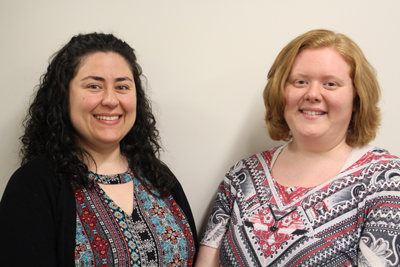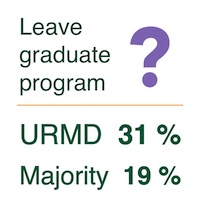Envisioning the Future of CERP
CRA’s Center for Evaluating the Research Pipeline (CERP) recently underwent staffing changes when former Director Jane Stout left CRA. Burçin Tamer, Ph.D., is now the Director of CERP and Heather Wright is the Associate Director. Under their leadership, CERP will extend its reach as a resource for the computing community through its Data Buddies Project, evaluation services, and other activities. Heather and Burçin are both excited to make contributions to the computing community and drive the broader mission of CRA to facilitate the development of strong, diverse talent in the field.

CERP as a Resource for the Computing Community
CERP’s main goal is to be a valuable resource for the computing community. It has an extensive data collection infrastructure and uses their data to perform evaluation, provide evidence-based recommendations, and contribute knowledge to the computing community at large. With the goal of increasing responsiveness to the computing community, the center will further develop services based on the community’s needs and make resources publicly and widely available.
The Data Buddies Project
CERP collects survey data from undergraduate and graduate students through the Data Buddies Project. The project currently includes 99 colleges and universities that volunteer as a network to reach computing students across the United States and Canada. The institutions distribute a survey link on behalf of CERP to all students affiliated with computing degree programs within their departments. With minimal-to-no burden on the departments that distribute the Data Buddies survey, the center is able to collect nearly 20,000 responses from students each year.
Once data collection through the project concludes, volunteer departments receive a customized annual report that provides several unique features. These reports include an executive “Your Institution at a Glance” page that visualizes some of the key variables for each institution. Additionally, the reports provide aggregated data tables comparing students from their institution against students from similar institutions. Finally, two additional chapters compare the institution’s students by gender and race/ethnicity presented alongside the comparison of similar institutions’ students by gender and race/ethnicity. These reports allow departments to not only learn about their students but also explore how their students’ experiences measure against those from similar institutions.
The Data Buddies Project also provides an opportunity to formulate a longitudinal data collection process through which CERP obtains data at multiple time points from students who agree to participate in the study. These data are invaluable for understanding the progression of students’ academic careers.
Is your department involved with Data Buddies? Contribute to this project and start receiving your own customized report by volunteering here.
Evaluation Services
CERP has an extensive number of evaluation services that can provide specific recommendations to clients seeking to improve their programs for participants at all career stages (i.e., undergraduates, graduate students, postdocs, career professionals, and faculty members). The center evaluates programs using a diverse set of methods, including formative assessment, pretest-posttest design, comparative evaluation, and quasi-experimental design. Data collected through Data Buddies provides a unique opportunity to produce these comparative and quasi-experimental evaluations.
CERP currently provides evaluative assessment of webinars, stand-alone workshops, conference workshops, formal Research Experience for Undergraduates programs, fellowship programs, Living-Learning-Communities, and professional development seminars. Examples of evaluation reports are available here.
Do you have a program you would like CERP to evaluate? Contact CERP here.
Other Activities
In addition to collecting survey data and providing program evaluation services, the center engages in a number of other activities. CERP’s data and analysis results are shared with the broader community through an interactive data visualization page and monthly infographics in Computing Research News. Furthermore, CERP uses its data resources and social science skills to make scholarly contributions to CS education research.
The center also has the capacity to provide data and research services beyond the available survey data. To date, it has responded to requests for empirical information on the state of computing education, designed and implemented data collection strategies to address specific research and evaluation needs, and served as a consulting body for social science research design.
What would you like to see in CERP’s future infographics? Submit your ideas here.
Support
CERP’s work is supported through National Science Foundation awards CNS-1246649 and DUE-1431112, and direct CRA contributions.
About the CERP Team
Burçin Tamer is the Director of CERP. She is responsible for overall operations and manages CERP’s data resources and infrastructure as well as analysis activities. Her work provides social science support to the computing community’s efforts for broadening participation. Burçin joined CRA as a Research Scientist at CERP in May 2015 and has been Director since April 2018. Prior to joining CRA, she completed her doctoral training in Political Science and Women’s Studies in 2015 at Pennsylvania State University, where she also received her Master of Arts degree in Political Science. At Penn State, she worked as a researcher on several large scale projects for which she designed and implemented data collection processes, performed analyses, and contributed to dissemination activities.
As Associate Director, Heather Wright leads CERP’s evaluation efforts for programs aimed at broadening participation in computing-related fields. Heather also manages CERP’s Data Buddies Project, a national survey initiative that collects data from undergraduate and graduate students across the United States and Canada. Heather holds a B.S. in Sociology and two minors in Technical & Business Writing and Women’s Studies. She has been with the CRA since 2013.
Want to receive more updates about CERP? Subscribe to their newsletter.








